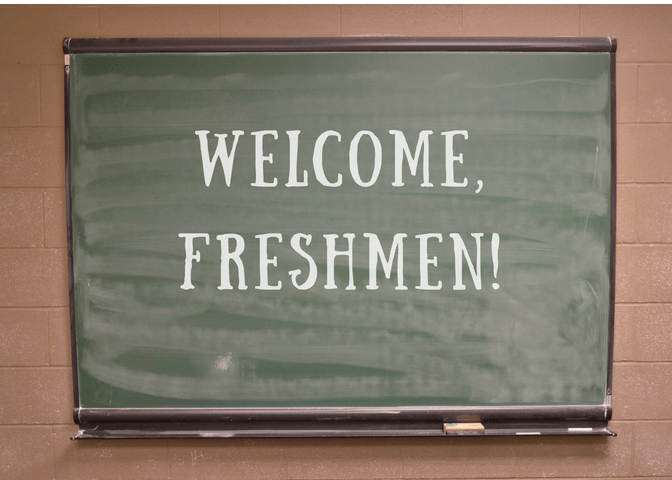The transition period between middle school to high school can be an exciting yet overwhelming time for teens. They are going through puberty, trying to ‘fit in’, and have hundreds of questions. High school comes with new routines, new environments, new social scenes, and new expectations. Below are 3 common high school fears and how parents can address them.
1. HOW TO HELP MY TEENAGER MAKE FRIENDS
One of the biggest concerns teens have is how they will be socially in high school. They wonder how to make new friends in high school, if they will fit in, and experience anxiety about “Freshman Fridays”.

Many times, “freshman” bullying is just a myth. If you as a parent are truly concerned about bullying issues in a specific school, it is best to do some research and ask parents in the community to check the facts. This way, you can be very confident when reassuring your teen that they are going into a safe school. You can also look into anti-bullying policies and get acquainted with the school counselors and anti-bullying heads.
This may also be a time to open up a dialogue with your teen about peers. Some suggestions would be to validate the feeling “I understand you feel ____and that has to be difficult” and then offering support “I can be here for you. What would be helpful?” or sharing a relatable anecdote to how you felt similarly.
If your teen is quite worried about fitting in and stressing about how to make new friends in high school, check out school-related activities and sports. The more involved they are; the more exposure they will have to like-minded peers. You can even get a list from an online search or by speaking with school personnel prior to beginning Freshman year. I would recommend at least one activity per marking period. You do not want it to overwhelm your teen but also do not want them to feel disconnected.
2. First Day Of High School Tips About Being Prepared and Getting Around
Many teens stress about getting lost, being prepared and getting to classes in time.
Parents may relate to the worry of getting lost. Some parents I speak to still have dreams of not finding their classrooms! This is a very common question for teens to have. They may have had the very same question during their previous school transition from elementary school to middle school. Teens will have uncertainties due to the sheer fact this is uncharted territory for them. They do not feel confident with the lay of the land and are stepping outside of the comfort zone that they had the previous 2-3 years (depending on your school system).
Middle Schools are often aware about incoming high school anxiety. Frequently, school personnel will assist students with these questions before they graduate middle school. For instance, they may help students choose their classes and schedule tours of the high school. Many times, feeling prepared will help ease nerves about getting lost. If your teen’s school does not have this built in, you can make your own transitional plan with your child. You can call the high school to coordinate when you would be able to go in and tour the school. Maybe you can get creative and create a ‘map’ with your teen as you are touring. When teens come to me with this question, I help them with their problem-solving skills. This includes asking the teens who can they talk to if they need help during the school day. It would be beneficial to know where the main office is so they have a point of reference.
3. High School Anxiety About Making The Grade
Teens frequently worry, “Is it as hard as people say? What if I can’t keep up? Am I prepared?”
I cannot tell you how many times teens have told me how scared they were about high school’s workload prior to entering and how relieved they were that it was not as bad as they imagined. Granted, this depends on the high school and the individual’s preparedness. There is always going to be an adjustment period. It can be helpful to remind your teen of how they felt beginning middle school and how they now feel about their abilities.
If your teen has struggled in the past to keep up academically, there are many resources available and more classes to choose from than in middle school. You can schedule a meeting with the guidance counselor or request to speak with specific teachers to help. There is a short period of time in which teens can transfer out of classes in the beginning of the school year. You may want to do this if you feel the class is not a good fit for your teen (whether it’s an AP class, Honor’s class, or regular education class). You can check out tutoring within the school as an additional resource. Sometimes upper-classmen will be available to tutor underclassman and/or teachers will tutor outside of classroom hours.
If your child has had an IEP or a 504 plan in the past, be sure to renew it with accommodations relevant to high school. This can be particularly helpful for teens who struggle with anxiety or a learning disability.
Transitions are usually filled with mixed emotions – this is completely normal! Following the above can help smooth out some bumps along the way. Your teen does not have to go through this period on their own- as much as they may want to! It is important to let them know there is some relief to be had through this time. Remind them of their past successes with new beginnings. Share with them that many students have high school anxiety and this is nothing to be ashamed of.
Still Concerned? When to seek help
If you feel your teen’s anxiety is unusually high or it is interfering with their daily life, speaking to a counselor could help. Some red flags that may mean your teen feels overwhelmed and would benefit from therapy are:
- Withdrawing and Isolation
- Becomes more tearful than usual
- Becomes more irritable
- Changes eating patterns
- Has difficulty with sleep or is sleeping more throughout the day
- Frequent complaints of not feeling well (headaches, stomach aches, being tired)
- Has a rapid drop in grades/academic achievement
- Has panic attacks
- States that they wish they were dead or has attempted to hurt themself in some way
Sometimes the level of worry is the biggest they have ever felt. The freshman adjustment to high school may be a bit of a shock. Perhaps your teen could benefit from learning some new skills. These techniques could be for stress management, academic organization, social skills, etc. Every period of growth calls for increased use of coping strategies – it is okay to reach out.
If your teen is struggling to cope with back to school anxiety, let us help.
Learn more about our Teen Anxiety Services





One thought on “3 Tips For The Freshmen Adjustment To High School”
Comments are closed.